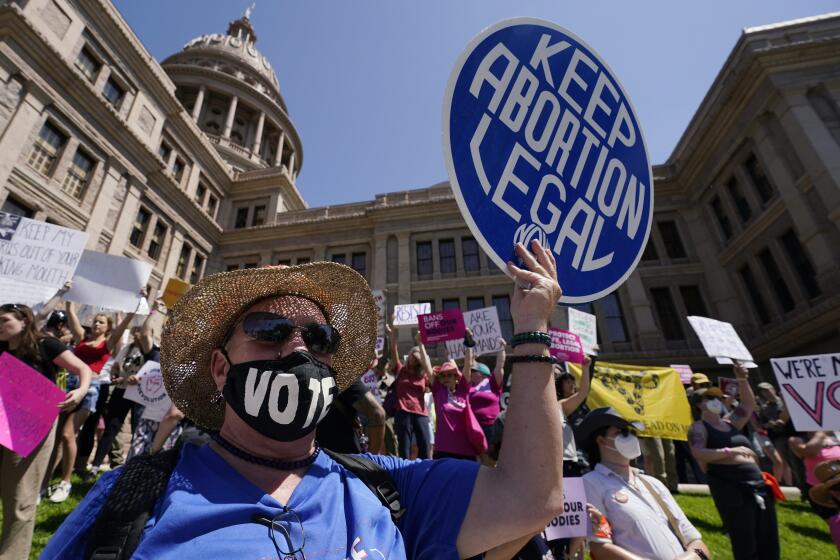Texas Supreme Court rejects challenge to state’s abortion law over medical exceptions

AUSTIN, Texas — The Texas Supreme Court on Friday rejected a challenge to one of the most restrictive abortion bans in the U.S. following a lawsuit by women who had serious pregnancy complications.
The unanimous ruling from the court, whose nine justices are all elected Republicans, is the latest decision to uphold Texas’ abortion ban, which critics say does not offer enough clarity as to when exceptions are allowed.
The court said the exceptions as written are broad enough, and doctors would be misinterpreting the law if they declined to perform an abortion when the woman’s life is in danger.
“Texas law permits a life-saving abortion,” the court wrote in the order signed by Justice Jane Bland.
Last summer, state District Judge Jessica Mangrum granted a temporary injunction preventing Texas from enforcing the ban against doctors who in their “good faith judgment” ended a pregnancy that they determined was unsafe because of complications.
Five women who said they were denied abortions even when pregnancy endangered their lives are suing Texas over its abortion ban.
But that was immediately blocked by an appeal from the Texas attorney general’s office to the state’s Supreme Court.
More than 20 women in Texas joined the lawsuit, including Amanda Zurawski, who had been told she had a condition that meant her fetus would not survive.
The Austin woman said she was forced to wait until she was diagnosed with a life-threatening case of sepsis before being provided an abortion.
“I am outraged on behalf of my fellow plaintiffs who the Court deemed not sick enough,” Zurawski said in a statement after the ruling. “We all deserve bodily autonomy. Every day, people in Texas are being told that they have no options. It’s sickening and wrong.”
The lawsuit, filed in March 2023, didn’t seek to repeal Texas’ abortion ban but instead aimed to force more clarity on when exceptions are allowed.
Texas Atty. Gen. Ken Paxton, whose office defended the law in the case, applauded the ruling.
Women who sued Texas after being denied abortions despite serious risks to their health are asking a court to step in and clarify the law and exceptions.
“I will continue to defend the laws enacted by the Legislature and uphold the values of the people of Texas by doing everything in my power to protect mothers and babies,” the Republican posted on the social media platform X.
The lawsuit argued that exemptions under the law, which allow an abortion to save a woman’s life or prevent the impairment of a major bodily function, are written too vaguely and create confusion among doctors, who were turning away some pregnant women experiencing health complications because they feared repercussions.
The plaintiffs said the abortion ban has made medical professionals wary of facing liability if the state does not consider a situation to be a medical emergency.
The Texas Supreme Court also declined to offer clarity on the exemptions late last year after Kate Cox, a mother of two from Dallas, sued the state for the right to obtain an abortion after her fetus developed a fatal condition and she made multiple trips to an emergency room.
Cox ended up leaving the state for an abortion before the court ruled that she hadn’t shown that her life was in danger. The court called on the state medical board to offer more guidance.
But the medical board’s proposed guidelines, unveiled this year, offered little beyond advising doctors to meticulously document their decision-making. And Texas’ Republican-led Legislature is not expected to make changes to the law’s language.
Zurawski, the lead plaintiff in the lawsuit, spent three days in intensive care and was left with a permanently closed fallopian tube from an infection, affecting her ability to have more children.
The court ruled that state law does not require that death or serious impairment be “imminent” when a woman is being evaluated by a doctor for an abortion.
“Ms. Zurawski’s agonizing wait to be ill ‘enough’ for induction, her development of sepsis, and her permanent physical injury are not the results the law commands,” the court wrote.
Under the law in Texas, doctors who perform abortions risk life in prison, fines of up to $100,000 and revocation of their state medical licenses. Opponents say that has left some women with providers who are unwilling to even discuss terminating a pregnancy.
Most GOP-controlled states have started enforcing new bans or restrictions on abortion since the U.S. Supreme Court in 2022 overturned Roe vs. Wade, which for nearly 50 years affirmed the constitutional right to an abortion.
Weber and Stengle write for the Associated Press. AP reporter Jim Vertuno contributed to this report.
More to Read
Sign up for Essential California
The most important California stories and recommendations in your inbox every morning.
You may occasionally receive promotional content from the Los Angeles Times.












